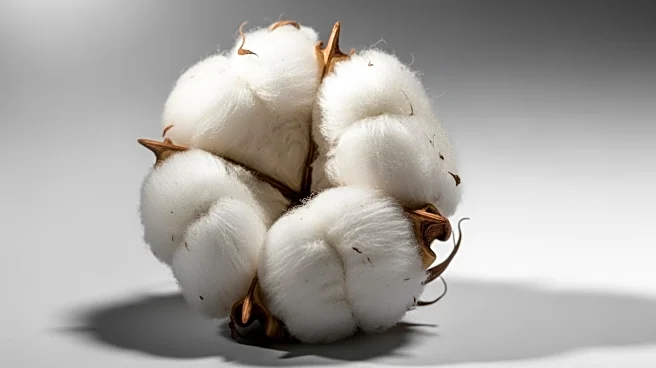What's Happening?
The Pakistan Cotton Ginners Association (PCGA) has uncovered significant issues within the cotton industry in lower Sindh, a region known for its cotton production. Recent surprise inspections by PCGA members revealed that some ginning factories are producing
adulterated lint cotton by mixing cotton waste with seed cotton. This practice compromises the quality of yarn and the strength of textile products. The adulterated cotton is being supplied to both domestic spinning and textile mills and exported, damaging the reputation of Pakistan's cotton sector. The PCGA's findings have led to legal challenges, with the association's members facing criminal proceedings after their actions against ginners in Tando Adam. Despite these revelations, concrete actions such as license cancellations or factory closures have not yet been implemented.
Why It's Important?
The adulteration of cotton poses a significant threat to Pakistan's cotton industry, which has been struggling to regain its footing. The practice undermines the quality of the cotton supply chain, leading to a preference for imported cotton from countries like the U.S. and Argentina. This situation not only affects the credibility of the industry but also impacts the livelihoods of cotton growers and the broader agricultural sector. The issue highlights the need for stricter regulatory oversight and enforcement to ensure fair trade practices and maintain the integrity of the cotton supply chain. The ongoing challenges could have long-term implications for Pakistan's position in the global cotton market.
What's Next?
The PCGA is likely to continue its efforts to expose and address malpractices within the cotton industry. There may be increased pressure on regulatory bodies to take decisive action against those involved in adulteration. The industry could see calls for reforms to improve transparency and accountability in the supply chain. Additionally, there may be discussions around providing premium prices for high-quality cotton to incentivize fair practices among ginners and growers. The outcome of the legal proceedings against PCGA members could also influence future actions and policies within the sector.
Beyond the Headlines
The issue of cotton adulteration raises broader questions about ethical practices in agriculture and the importance of maintaining quality standards. It also highlights the challenges faced by developing countries in balancing economic growth with sustainable and fair trade practices. The situation underscores the need for collaboration between industry stakeholders, government agencies, and international partners to address systemic issues and promote a more resilient and competitive cotton industry.
















